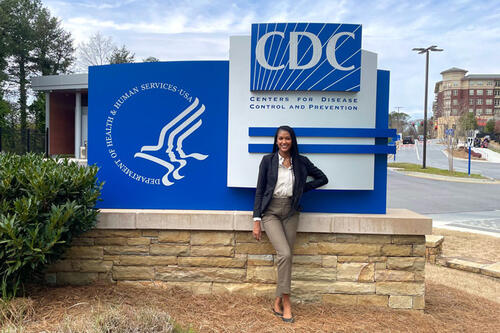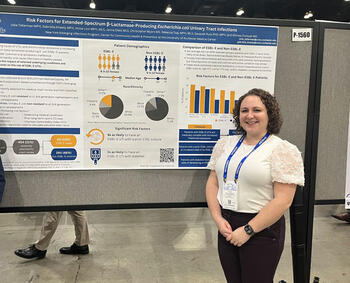
Sydney Alexander '19 (photo provided)
Infectious diseases are often front-page news, and Geneseo alums are on the front lines in helping to prevent them.
Surveillance epidemiologists Sydney Alexander ’19, MPH (mathematics), and Julia Tellerman ’20, MPH (applied mathematics), both work with the Centers for Disease Control and Prevention’s Emerging Infections Program (EIP). The program collects data from a 12-state network of health departments, academic institutions, and other partners, then uses the data to track risk factors and prevent outbreaks of communicable diseases.
Tellerman works with the EIP through the University of Rochester Medical Center (URMC) in Rochester, New York; Alexander through Emory University in Atlanta, Georgia. Both support the EIP’s ultimate goal: to inform policy and public health practice.
“I’m passionate about public health,” says Tellerman. “It’s something that impacts you from before you’re born until the day you die.”

Tellerman’s group at URMC focuses on community health and prevention, looking at antibiotic-resistant infections such as E. coli and staph—organisms that can be difficult to treat and therefore critical to prevent.
“We identify patients who get these infections, review their medical risk factors, and aggregate that information to identify preventive efforts,” she says. “For example, certain health conditions may put patients at risk of a resistant infection, which is important to know when prescribing antibiotics. Understanding these trends and their populations helps guide public health interventions and preventive measures.”
Alexander’s group conducts surveillance on illnesses often reported in the news, such as COVID-19, RSV, and flu, and tracks trends and rates of hospitalization. A former pre-med student, she has a personal interest in the preventive aspects of health care.
“As a black woman, I’ve experienced discrimination and seen the health discrepancies that people of color and low income can face,” Alexander says. “I decided to pursue a career in public health to help my communities and try to mitigate those discrepancies. We’re giving out the quality information that people need to make informed decisions.”
The pandemic underlined for both Alexander and Tellerman the growing market demand for epidemiologists. In graduate school at the time, they were “literally learning about what we were experiencing right then, how to deal with outbreaks and epidemics,” says Alexander.
The public health field has shown a growing interest in mathematical modeling since COVID, notes Tellerman, who sought a career that encompassed more than theoretical math. “There’s so much health data out there, and it’s important to know how to work with it. The quantitative aspects of epidemiology are really well supported by a math background.”
“A lot of people say—and I do believe this—that when you have a math degree, you can do anything,” Alexander says. “It helps with being a problem-solver in general. The skills you get from a math degree, you can transfer to any field.”
Learn more about Geneseo’s mathematics department.